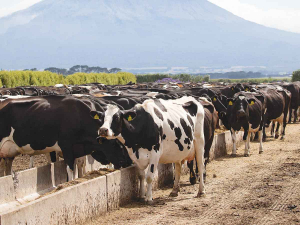Don't reduce supplementary feed
As the new dairy season gets underway and farmers tackle ongoing financial challenges, they are being urged not to make hasty decisions about selling cows and cutting back on supplementary feed.
 Keith Arnold, Graincorp Feeds' national operations manager, says he's seen quick fixes to supply chain problem have major ramifications.
Keith Arnold, Graincorp Feeds' national operations manager, says he's seen quick fixes to supply chain problem have major ramifications.
Over the last three years almost every industry has faced upheaval.
As Covid disrupted lives, a succession of dominos toppled, starting with the global workforce. With workers down, every link of every supply chain was affected.
Keith Arnold, national operations manager at GrainCorp Feeds, coordinates the importing and distribution of a range of supplementary feed to New Zealand dairy farmers.
Upon arrival, these products must then be transported to liquid and dry storage facilities dotted around New Zealand, located to service each region.
From these storage facilities, Arnold must ensure that some products are dispatched as they are, while others are blended to the requirements of individual farmers. Once blended, these customised feeds must then be transported to farmers.
That’s a lot of moving parts.
To say that Arnold’s job is now more difficult is an understatement. Far from perplexed, he’s loving the challenge.
“I’m a natural problem-solver, so I’m like a pig in mud when there’s a puzzle to be solved. Not everyone likes handling lots of moving parts, but I actually need it.”
Because the company sells products from both locally and around the globe, synchronising the arrival of these ingredients is a supply-chain challenge. There are bulk liquid tankers to manage, bulk dry ships carrying dry feed, and container ships carrying bulk feeds and additives.
With so many links, it is inevitable that there will be challenges. With production deadlines here in New Zealand, it is tempting to reach for whatever quick fix will get the job done.
But even when a rapid intervention is required, Arnold is always mindful of the future consequences.
“I always ask this question: If we take this logistical action now, how will it affect our ability to supply farmers in the future? I’ve seen quick fixes lead to bad ramifications down the track, and those consequences are often relational.
“If you manage to get products supplied today, but do it by burning the relationships you’ll need tomorrow, what have you gained?”
“That’s why I tell my team to let me know if there are any issues putting strain on our key supply chains.”
Global trade has been thrown into another bout of uncertainty following the overnight ruling by US Supreme Court, striking down President Donald Trump's decision to impose additional tariffs on trading partners.
Controls on the movement of fruit and vegetables in the Auckland suburb of Mt Roskill have been lifted.
Fonterra farmer shareholders and unit holders are in line for another payment in April.
Farmers are being encouraged to take a closer look at the refrigerants running inside their on-farm systems, as international and domestic pressure continues to build on high global warming potential (GWP) 400-series refrigerants.
As expected, Fonterra has lifted its 2025-26 forecast farmgate milk price mid-point to $9.50/kgMS.
Bovonic says a return on investment study has found its automated mastitis detection technology, QuadSense, is delivering financial, labour, and animal-health benefits on New Zealand dairy farms worth an estimated $29,547 per season.
OPINION: Staying with politics, with less than nine months to go before the general elections, there’s confusion in the Labour…
OPINION: Winston Peters' tirade against the free trade deal stitched with India may not be all political posturing by the…